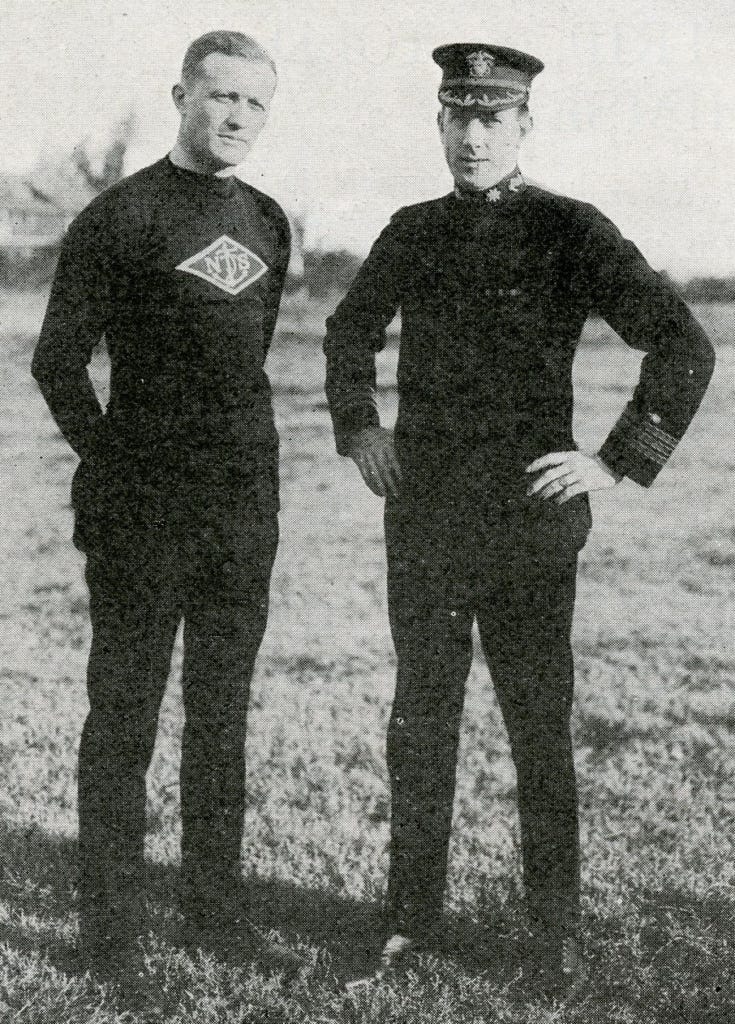Previewing the 1919 Rose Bowl: December 29, 1918
The 1919 Rose Bowl featured two military camp teams playing football in a nation recently returned to peace. Both had proven themselves to be the best college or service teams on their side of the country, but had taken different paths to Pasadena.
The Great Lakes Naval Training Station received the first invitation to the 1919 Rose Bowl. They underperformed in the early season before the assistant coach, Lt. Clarence McReavy, took over for Bo Olcott. In his first game as head coach, Great Lakes tied a Notre Dame team led by first-year head coach Knute Rockne along with a pair of freshmen named George Gipp and Curly Lambeau. Great Lakes then went on a run by beating the highly considered Rutgers and Naval Academy teams, as well as Purdue, to finish 5-0-2. Their victories in the East and Midwest showed they were clearly the best college or service team east of the Rockies.

Great Lakes' roster consisted of stars from the Big Ten and Notre Dame, along with a mix of small college players from the Midwest. They were a talented, athletic bunch fully immersed in the sporting world. In the years after the Rose Bowl, fourteen played and five coached in the early NFL with three—George Halas, Paddy Driscoll, and Jimmy Conzelman—earning Pro Football Hall of Fame status. Four played Major League Baseball and ten were college head coaches during their lives. But that was all in the future and Great Lakes had a month to rest and repair for a game against an unknown opponent. In fact, Great Lakes would board a train in Chicago, cross the country, and arrive in Los Angeles before their opponent was determined.
The Western representative took a longer and more difficult route to the Rose Bowl. As an earlier post described, the effect of the Spanish Flu on the West Coast meant that few games were played in October, so teams packed November and early December with games, after which it still remained unclear which team should represent the West in the New Year's Day game. That led the Rose Bowl Committee to set up a five-team tournament to determine the Western Service Championship which ended with a Mare Island Marines victory over Balboa Park Naval on Christmas Day. The victory gave Mare Island a week to travel from the Bay Area to Pasadena and rest their injured bodies. Unfortunately, it would not be enough time. Coming out of the Balboa Park game, Dick Hanley remained hospitalized, while star running back Benton Bangs, fullback Bill Steers, and tackle Nate Shanedling nursed injuries, while Hanley's brother, Pat, had influenza as well.
But in one of the oddities of military life that presaged the free agency of future decades, Mare Island made arrangements to add a few players to their roster as the season came to a close. With the war over, military necessity no longer ruled the day for the Marines stationed stateside so commanders at other Marine locations agreed to transfer to Mare Island several Marines who had played the 1918 season starring for other teams. One was Millard Calhoun from Bremerton Naval Base, who earned honorable mention status as a running back on Walter Camp’s All-Service team. He transferred to Mare Island in mid-December, while back east, John Budd and Ed Crosetto finished the season playing for the Philadelphia Naval Yard. With League Island's season over, both were transferred to Mare Island, arriving on Christmas Day when Mare Island played Balboa Park. All three transferred Marines would play in the Rose Bowl for Mare Island with John Budd starting the game.
In the few days leading up to the Rose Bowl the teams practiced and were hosted at various sites around Southern California. For the Midwesterners of Great Lakes, the trip to Pasadena marked the first time they had crossed the Rockies, seen oranges growing on trees, or walked the lots of the burgeoning, motion picture studios. Mare Island's team included a few Southern Californians who had seen these sites before, but the bulk of the team focused their energies on mending themselves and preparing for what they knew would be a difficult game with the Jackies of Great Lakes that was only two days away.
If you enjoyed this article, consider subscribing to my newsletter or check out my books.


